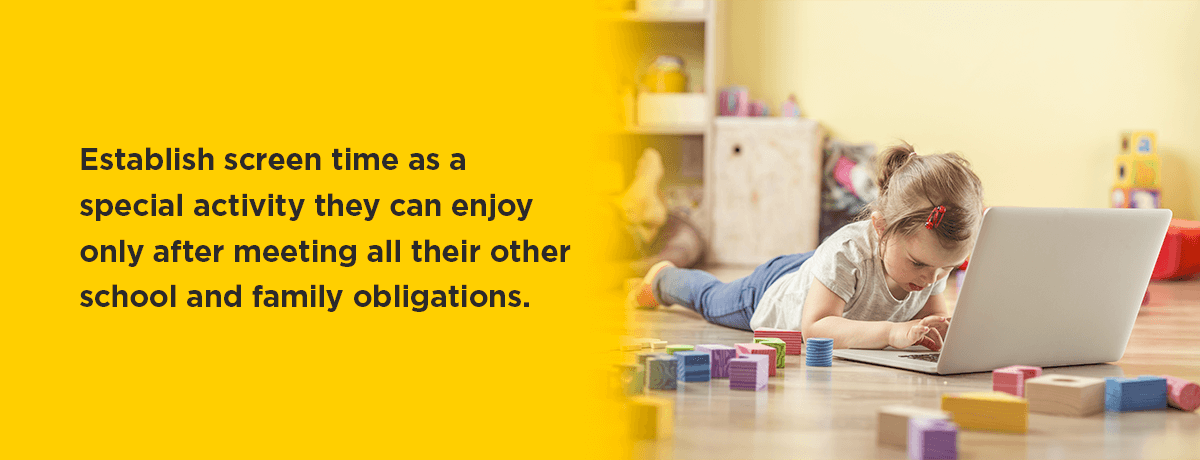All parents want their children to excel academically. However, parents also want their children to enjoy childhood. Children should learn to achieve a balance between schoolwork and fun activities. Time management skills will help them as they advance through school and prepare for future careers. Follow these tips to teach time management for kids and help get your child on a path to success.
Grades K-5
Younger children need more help establishing routines and maintaining their focus. You can help your child develop the tools to self-motivate and improve kids’ time management skills with these tips.
- Set up a workspace: Start with organization— time spent searching for a pencil is time not devoted to learning. Having a dedicated workspace for school will help your child get in the right headspace for school and help minimize distractions.
- Use timers: Use a visual timer app or hourglass to help younger children conceptualize time in increments. Establish consequences for failing to use time wisely. When assignments are late, make it your child’s responsibility to tell the teacher what happened and determine how to prevent the problem from recurring. Time management for elementary students is about teaching responsibility and establishing habits they can build upon when they’re older.
- Create a schedule: In the higher elementary grades, teach children the basics of scheduling through estimating the time needed for various tasks and reflecting on its wisest use. Help them understand the difference between responsibilities and hobbies, and teach them to break down long-term projects into smaller steps.
- Make a bedtime routine: Nothing wastes precious time like the nightly fuss over getting ready for bed. Plus, calm at bedtime promotes a good night’s rest, which prepares your child to make the most of the day ahead. Maintaining a regular bedtime routine teaches your child to recognize when it’s time to brush teeth, put on PJs, and enjoy a bedtime story. Compliance is likelier when expectations are crystal clear.

Middle School
At this age, self-awareness becomes a vital time management tool. At what time of day is your middle schooler’s concentration at its peak? When does it lag? Help your child study their most challenging subjects first to save time and promote more efficient information processing.
- Create a daily schedule: Set priorities, assess available time, and include downtime to teach middle schoolers better time management and help them take responsibility for their day.
- Use a planner: Get your child a planner and have them keep track of their assignments and due dates. While online calendars can help with remembering due dates, a physical planner with different colored pens can help your child feel more involved with their organization skills.
- Manage screen time: Time for video games, social media, and television is a valuable part of every child’s week, but too much can detract from two of the most crucial things your child must do — learn and be active. Establish screen time as a special activity they can enjoy only after meeting all their other school and family obligations. Limit usage to specific times and days. Though a little flexibility is OK, don’t waver too much. Schedule family technology-free time, giving everyone a chance to catch up on each other’s lives. And always turn off all screens at least 30 minutes before bedtime, allowing your child to power down from the day and ease into a good night’s sleep.
- Organize the space: Teach your middle schooler organization and responsibility by having them organize their schoolwork and tools. Give them folders, binders, and pencil cases to help them keep track of any paperwork or notes. Encourage personalizing organizational tools and have them divide up completed work, due work, and more. You can also have them set up computer folders for any digital documents and notes.
High School
Increasingly, high school students take responsibility for time management, even as they add jobs and social events to their calendars.
- Review with them: Parents can help them review their schedules and find the unproductive blocks when even a few moments spent on small tasks ease the evening workload of homework and studying.
- Set goals: Work with your child on setting long- and short-term goals. They need to start planning for school and their futures afterward — whether that’s acceptance into college, joining the military, pursuing career training, or joining the workforce. What goals do they want to achieve once they graduate? Do they need to do any projects, applications, or extracurriculars to improve their post-school success? Help them prioritize these objectives so they can learn to juggle different time frames.
- Manage screen time: High schoolers often have more freedom with their devices — they’re communicating with friends and clubs and working on their adult independence. Work with them to find a balance among screens, school, friends, and family. Most of the responsibility should be on them at this age, but you can still set limits on video game time and require family periods each day.
- Get some sleep: While high schoolers need less sleep than younger children, they should still prioritize sleep — between school, planning for the future, friends, and extracurriculars, it’s easy to lose out on necessary rest.
- Encourage boundaries: Remind them that it’s OK to say no to invitations, activities, and extracurriculars that consume too much time and distract from their goals. Students at this age might feel pressure to do everything they can, which can lead to burnout. Help them focus on their goals and defend their priorities.

Supporting School Success With the A-B-C System
As you teach kids time management skills, help them understand that school success depends on learning to prioritize. Even at an early age, kids know how the alphabet begins, so the A-B-C system is an effective introduction to managing the demands of school life.
Start by working with your child to list all the things they need to do. Then, label each “A,” “B,” or “C.”
- “A” tasks are the most pressing, such as completing homework assignments that are due tomorrow or studying for a test that’s coming in a few days.
- “B” tasks are looming. These could be end-of-semester projects — not a top priority right now, but sure to become one. As the due dates near, these tasks will move to the “A” list.
- “C” tasks are everything else. These might be things to accomplish in brief snippets, such as neatening a desk or walking the family dog.
Help your child stick to completing the “A” tasks first. Remind them to track the time needed to finish each task to help plan accurately for similar projects in the future.
More Strategies to Teach Your Kid Time Management
Using these additional tips to teach time management can help your child succeed at school and make family life run smoothly every day.
Create a Family Calendar
At CCA, learning is a family affair. We deliver learning at a pace that suits your child and your family’s lifestyle, with supports and programs designed to accommodate your unique needs. In the quest to make learningpart of everyday life, our parents tell us that maintaining a family calendar keeps everyone in the household on track and in tune with each other’s priorities.
Calendars are especially useful in managing all the events and activities of family life in addition to schooling, such as medical appointments, sports practices, music lessons, play rehearsals, and family outings. Developing a calendar doesn’t have to be complicated. Create a calendar on banner paper or a whiteboard, color-coding each family member to differentiate everyone’s demands at a glance. Calendaring by the month gives children a visual representation of time, so they can learn to use it effectively. Good calendaring also promotes organization that frees time for quality family outings, whether that’s a vacation getaway or a fun time together in the backyard.
Include Free Time
Schedules are valuable, but your child is not a machine. Incorporate free time to let them play and relax. When it’s time to return to work, your child will feel refreshed and energized. Accounting for free time teaches your child that time management isn’t about immediately jumping from one assigned task to the next. Downtime prompts the child’s brain to reset and absorb the day’s lessons. With CCA’s flexible scheduling, cyberstudents can pace their lessons and studies to suit their priorities and energy levels. Plus, they have the freedom to schedule field trips and other extracurricular activities that reinforce academics and keep them active and engaged in learning.
Don’t Overschedule Your Kids
Without the travel and class shuffle of in-person school, it can be tempting to give your child extra work. However, adding more work to their day can easily overwhelm children, who can fall behind under the stress of too much school. Communicate with your child and their teacher to find a workload and class schedule that fits their pace and makes their day enjoyable. A little stress or challenge can be beneficial sometimes, but piling on projects will make school more stressful for your child.
Help Your Kids When They Struggle
No matter their age, your child needs your support. Let them know they can reach out to you and their teachers whenever they need help. At CCA, our teachers have set times where they can meet with students who need assistance. Help your child contact their teacher and set up a meeting if they need extra class support. They can make action plans to give your child a framework to help with improvement.
If your child is struggling with the transition or feels stressed at school, be there for them. Check in with them regularly about more than just their school progress. Ask them how they’re feeling about classes, routines, work, and anything outside school. Are they happy? Is there a hobby or de-stressor they’d like to do after they finish school for the day? Your child’s mental and emotional health are just as vital as their academic success — be there for them when they need it.
CCA Supports Time Management in School and at Home
At CCA, our families constantly tell us that time management is one of the most essential things we teach. Students learn to take responsibility for theirassignments and obligations. By the time they graduate, our personalized approach to learning and career readiness prepares them for whatever comes next. College admissions officers know our learners are disciplined and ready for college-level work. Employers and career training schools welcome the initiative and efficiency our graduates bring. Learn more about CCA’s flexible and personalized approach to education.






